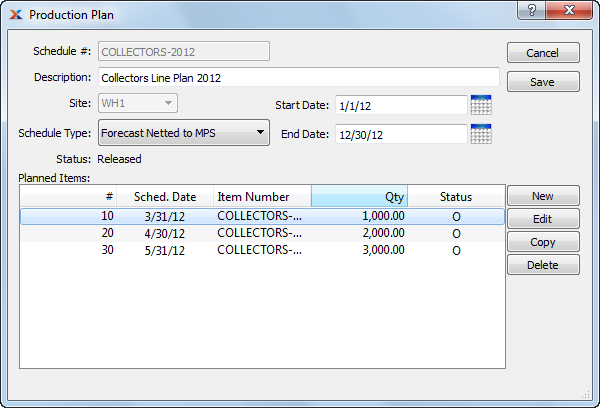
|
xTuple ERP Reference Guide |
Production plans are used for loading sales forecasts into the system. These forecasts are then accounted for when the master production scheduling (MPS) system is run. Firm planned orders may be created for items listed on production plans as the result of an MPS run. To create a new production plan, go to . The following screen will appear:

When creating a new production plan you are presented with the following options:
Enter a name to identify the production plan.
Enter a brief description of the production plan.
Specify the site where the forecasted quantity would be located. By specifying a site you indicate the specific item site which the MPS planning system should create planned orders for, if required.
Select one of the available production plan schedule types:
Planning items having this schedule type are not taken into account by MPS. Instead, use this schedule type for reporting purposes only, such as the reporting found on the MPS Detail screen. Forecast reporting can be useful as a reference of progress against cumulative MPS schedules, usually in scenarios where demand is discontinuous or lumpy, but production schedules are continuous.
Used for forecast reporting and netted as demand to existing supply by the MPS processor for items scheduled inside the demand time fence. Use where you desire supply to automatically be created to fulfill, but not exceed, the greater of forecasted and actual demand. Inside the demand time fence, MPS ignores the forecast and plans an amount based on actual demand net of projected availability. Outside of the demand time fence, MPS uses the larger of actual demand or the forecast and nets this against projected availability.
Cumulative schedules allow the forced accumulation of inventory in a discontinuous or lumpy demand situation where load leveling or continuous production is desired. With this setting, MPS may release more, but never less, than the quantity dictated in a cumulative MPS schedule. Inside the demand time fence, cumulative schedules are ignored—and only actual demand is considered. Outside the demand time fence, planned orders for cumulative schedules are created per the greater of schedule quantity or net actual demand. The system interprets net actual demand to mean that it will use, for a given period, the larger of A) cumulative schedule quantity or B) quantity required to accommodate time-phased availability (i.e., QOH + qty. on order - allocations).
Displays the current status of the production plan.
Production plans may exist in either of the following two statuses:
U = un-released
R = released
The master production scheduling (MPS) system will only consider production plans which have been released. Any un-released production plans will be ignored by MPS when it is run.
Enter the first date when MPS items may be added to the production plan. Items having a planned date earlier than the date entered here may not be added to the production plan.
Enter the last date when MPS items may be added to the production plan. Items having a planned date later than the date entered here may not be added to the production plan.
Displays the current list of planned items associated with the production plan.
The following buttons are unique to this screen:
Use this button to toggle between the active and inactive status for the selected planned item.